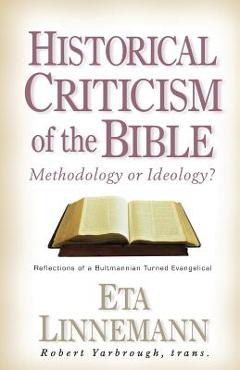Historical Criticism of the Bible: Methodology or Ideology? Reflections of a Bultmannian Turned Evangelical - Eta Linnemann

Detalii Historical Criticism of the Bible:
libris.ro
139.45 Lei
154.94 Lei
Religion
Eta Linnemann
Historical Criticism of the Bible: - Disponibil la libris.ro
Pe YEO găsești Historical Criticism of the Bible: de la Eta Linnemann, în categoria Religion.
Indiferent de nevoile tale, Historical Criticism of the Bible: Methodology or Ideology? Reflections of a Bultmannian Turned Evangelical - Eta Linnemann din categoria Religion îți poate aduce un echilibru perfect între calitate și preț, cu avantaje practice și moderne.
Preț: 139.45 Lei
Caracteristicile produsului Historical Criticism of the Bible:
- Brand: Eta Linnemann
- Categoria: Religion
- Magazin: libris.ro
- Ultima actualizare: 10-05-2024 01:05:14
Comandă Historical Criticism of the Bible: Online, Simplu și Rapid
Prin intermediul platformei YEO, poți comanda Historical Criticism of the Bible: de la libris.ro rapid și în siguranță. Bucură-te de o experiență de cumpărături online optimizată și descoperă cele mai bune oferte actualizate constant.
Descriere magazin:
In Historical Criticism of the Bible Eta Linnemann tells how modern Bible scholarship has drifted far from the truth, and why its assumptions are nonetheless so influential and thereby inherently dangerous. In part 1 she analyzes the ideas that have shaped Western thought through four centuries, explaining how secular humanism, the Enlightenment, and German idealism have influenced Western universities in general and biblical scholarship in particular. In part 2 she argues that historical criticism constitutes an ideological system rather than the objective scientific method scholars say they observe--exposing the presuppositions and dangers of the historical-critical system. Every leader and participant in our educational system owes it to themselves and to the public to face the issues starkly laid out in this volume. The intellect is in severe trouble today, and Eta Linnemann shows clearly why. Her analysis sets the agenda for responsible Christian intellectuals and ministers in our day. --Dallas Willard, University of Southern California. She offers important insights and challenges to all who, within the academic enterprise, seek to be faithful interpreters of the Scriptures as the Word of God. --E. Earle Ellis, Southwestern Baptist Theological Seminary

Produse asemănătoare
Produse marca Eta Linnemann

Historical Criticism of the Bible: Methodology or Ideology? Reflections of a Bultmannian Turned Evangelical - Eta Linnemann
![]() libris.ro
libris.ro
Actualizat in 10/05/2024
139.45 Lei